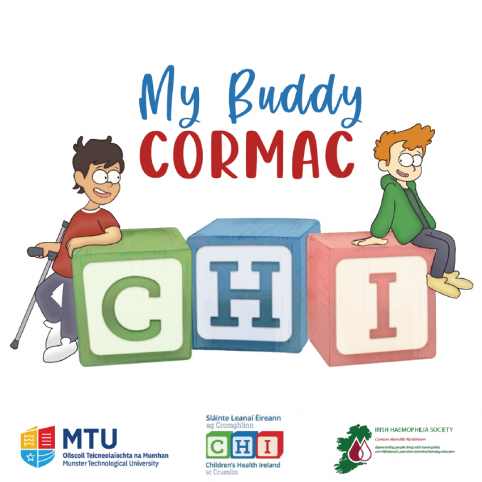Students from the Creative Media Department of Munster Technological University working in collaboration with Children’s Health Ireland (CHI) at Crumlin and the Irish Haemophilia Society, are creating an innovative education tool for children with Haemophilia and their families.
“My Buddy Cormac“ a positive awareness animation about Haemophilia, focuses on the experience and challenges faced by children with Haemophilia when treatment in hospital is required. The story is told from the perspective of a child and delivers an enlightening and creative take on events.
The project is being developed by work placement students, Jack Finnerty – Lead Animator, Illustrators and Storyboard Artists – Grace O’ Shea, Jack Roche, and Kate Mc Donnell, who are all studying a BA (Hons) in Animation, VFX and Motion Design. Patrick Lynch is the Music Composer/Sound Designer and Script Writer and is studying a BA (Hons) degree in Music Technology at MTU, Kerry campus.
“My Buddy Cormac” is already reaping the rewards of its success. According to the students/creators “Working with people we deeply admire and respect and being part of a project that will bring awareness to this condition while also imparting reassurance to young children and families experiencing the condition has rendered “My Buddy Cormac” a milestone in all of our careers”.
The project is being coordinated by lecturers, Rosie Dempsey who is the Industry Coordinator and Marty Boylan, Animation Course Leader. Rosie and Marty say the “collaboration with Children’s Heath Ireland at Crumlin has been an invaluable opportunity for students to apply their knowledge to real world problems, while also benefiting from the enriching experience of seeing first-hand the amazing work the medical team undertakes at Children’s Health Ireland”.
A progress report on the project was issued today to mark World Haemophilia Day.
The animation and visual guide, which is aimed at children aged between eight and 12, will be ready for release in May and will be made available on the CHI Crumlin and Irish Haemophilia Society websites. Some images of the guide have been released today.
Dr Beatrice Nolan, Consultant Haematologist at CHI at Crumlin, said that the students were developing an educational aid that will make a big difference to young children with haemophilia and their families.
“The animation developed by MTU students will make learning more fun and enjoyable and help the child and family develop a deeper understanding of Haemophilia and joint bleeds. It will be much easier for families to access this educational tool online and we hope to develop more in the future,” said Dr Nolan.
Today is World Haemophilia Day, which is an international awareness day for haemophilia and other bleeding disorders. It is held annually on April 17, date of the birthday of Frank Schnabel, founder of the World Federation of Haemophilia. Since 1989, World Haemophilia Day is the day the whole bleeding disorders community comes together to celebrate the continuous advances in treatment while raising awareness and bringing understanding and attention to the issues related to proper care to the wider public.
Haemophilia describes a group of inherited blood disorders in which there is a life-long defect in the clotting mechanism of the blood. It is associated with recurrent spontaneous bleeding, particularly into joints and muscles, from early childhood. A child’s diagnosis of Haemophilia is life-changing in its effects on both the child and the parents, who face a future of managing bleeding risk while trying to provide the child and his siblings with as normal a life as possible. There are approximately 860 people in Ireland suffering from Haemophilia of which 240 are under 18.
The theme of this year’s World Haemophilia Day is: “Adapting to change: sustaining care in a new world” and, according to Dr Nolan, children with haemophilia are no different to anybody else in having to deal with the impact of the COIVD-19 pandemic.
“The COVID-19 pandemic is having a major impact on people with a bleeding disorder so that objective has never been more important,” said Dr Nolan. “The Haemophilia community is made up of a great diversity of people—from patients and their families, to physicians, nurses, physiotherapists, psychologists and researchers—each of whom has been affected by the pandemic in a different way.”
The Haemophilia service at CHI Crumlin, which is led by Dr Nolan, has a dedicated team of Clinical Nurse Specialists, a Physiotherapist, a Psychologist, and a Social Worker who provide comprehensive care to children and their families with haemophilia and other bleeding disorders.
Brian O’Mahony, Chief Executive of the Irish Haemophilia Society, said: “This project provides information in a format which will be used by children with haemophilia and in language which is age appropriate. This will be of great benefit in helping educate the children about their bleeding disorder” stated Brian O Mahony, Chief Executive of the Irish Haemophilia Society.
There are three haemophilia Comprehensive Care Centres in Ireland. All three centres are certified as European Haemophilia Comprehensive Care Centres (EHCCC):
– Children’s Health Ireland at Crumlin
– The National Coagulation Centre (NCC) in St. James’s Hospital in Dublin
– The Coagulation Centre in Cork University Hospital (CUH)
In addition, University Hospital Galway functions as a Haemophilia Treatment Centre for adults and children. The Haemophilia Treatment Centre in Galway University Hospital is certified by the European Haemophilia Network (EUHANET).
The centre at CHI at Crumlin will move to the new children’s hospital on a shared campus with St James’s Hospital which will benefit our patients and their families.
For further information about Haemophilia visit:
The Irish Haemophilia Society: www.haemophilia.ie
The National Haemophilia Council: www.nationalhaemophiliacouncil.ie
World Federation of Haemophilia: www.wfh.org/en/home
